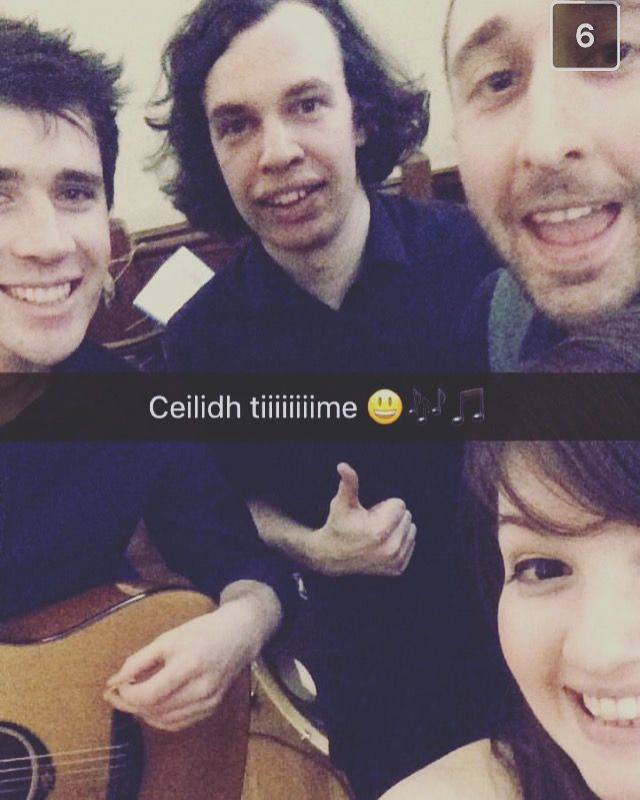The Brogues

Cubase 5 price. The Brogue Irish Pub. In Port Credit. All your favorite Irish pints, poured perfect, every time. Delicious and hearty meals inspired by the emerald isle. Family owned and operated.
The Brogues in 1965. | |
| Background information | |
|---|---|
| Origin | Merced, California, United States |
| Genres | |
| Years active | 1964–1965 |
| Associated acts | Quicksilver Messenger Service |
| Past members |
|
The Brogues were an American garage rock band formed in Merced, California, in 1964. Much of the group's brief recording career was marked by distorted-guitar melodies and R&B-influenced vocals. They released two regionally successful singles in their brief existence, most notably the Annette Tucker and Nancie Mantz-penned 'I Ain't No Miracle Worker', which is now considered a classic of the garage rock genre. The song has also appeared on several compilation albums, and has been covered by other music artists.
History[edit]
The band members all possessed prior experience on the R&B club circuit before coming together as a group influenced by the outset of the British Invasion, more specifically the music of the Animals and the Pretty Things. The group's name, the Brogues, was chosen to represent 'American music with a British accent'.[1] The band's original lineup, consisting of Eddie Rodrigues (lead guitar), Rick Campbell (organ), Greg Elmore (drums) and Bill Whittington (bass guitar), debuted on New Year's Eve, and immediately gained a loyal local following in their hometown of Merced and an emerging presence in San Francisco.[2] While their contemporaries outfitted themselves conservatively, the Brogues sported a rebellious image and performed hard-edged cover versions of British R&B standards such as 'Hubble Bubble Toil and Trouble' and 'Mama Keep Your Big Mouth Shut'.[3]
Initially, the Brogues' high energy performances were received with negative reception by San Francisco's burgeoning folk movement. Nonetheless, the area quickly developed a liking for the group's sound, and, noticing their rising notoriety, the Brogues self-recorded several demos in Fresno.[1] Though the cuts garnered little interest from most of the record companies the group presented them to Clara Thompson of the small record label, Hush Records, who upon hearing the tapes, immediately instructed her son to sign the Brogues to a recording contract. On June 23, 1965 the band entered Coast Recorders Studio in San Francisco to record their two original numbers 'Somebody' and 'But Now I Find'.[4] 'Somebody', which saw Campbell switch to bass guitar and Whittington to acoustic guitar, was a folk rock tune. The latter song, 'But Now I Find', better represented the group's sound in live performances with Kinks-inspired instrumental arrangements. In August 1965, 'Somebody' was released as the Brogues' debut single, and peaked at number 31 on Bakersfield’s KAFY radio, and reached number 14 on KYOS radio.[5]
As a result of the single's regional success, the group toured with other musical acts like the Zombies, Jewel Akens, and Shirley Ellis, among others. After a performance in Stockton with local group the Ratz, the Brogues enticed their singer Gary Cole (also known as Gary Duncan) to join the group. Once their stay in San Francisco ended, the band traveled to Sunset Recorders in Los Angeles to record their follow-up single for Challenge Records, who had purchased the distribution rights to 'Somebody'.[6] Pressed for time, the group recorded the Annette Tucker and Nancie Mantz-penned song 'I Ain't No Miracle Worker', and composed 'Don't Shoot Me Down' right in the studio. However, the group's 'I Ain't No Miracle Worker' failed to breakout nationally as a consequence of their record label focusing their advertising efforts on The Knickerbockers' hit, 'Lies'. Since its initial release, 'I Ain't No Miracle Worker' has become considered a garage rock classic and is featured on the 1998 reissue of the compilation album, Nuggets: Original Artyfacts from the First Psychedelic Era, 1965–1968.[7] The Brogues disbanded before they could promote the single when Rodrigues and Campbell were conscripted and the group could not find suitable replacements.[1]
After the band's breakup, Duncan and Elmore stayed in San Francisco and formed the psychedelic rock band Quicksilver Messenger Service. Additionally, Whittington joined the folk rock group, the Family Tree.[8] In 1996, Sundazed Records released an extended play containing the Brogues' material on their two singles.[5]
Discography[edit]
- 'Someday'/'But Now I Find' (7', Twilight, 1965)
- 'Don't Shoot Me Down'/'I Ain't No Miracle Worker' (7', Challenge, 1965)
References[edit]
- ^ abcPalao, Alex. 'THE BROGUES MERCED MIRACLE WORKERS'. 60spunk.m78.com. Retrieved August 9, 2015.
- ^Montfichet, Stansted. 'The Brogues - Biography'. allmusic.com. Retrieved August 10, 2015.
- ^'Someday / But Now I Find / I Ain't No Miracle Worker / Don't Shoot Me Down (EP booklet)'. Sundazed Records. 1996.Missing or empty
url=(help) - ^'Merced Music - The Brogues'. mercedmusic.com. Retrieved August 10, 2015.
- ^ ab'The Brogues'. sundazed.com. Archived from the original on September 5, 2015. Retrieved August 10, 2015.
- ^Kaye, Lenny (1998). 'Nuggets: Original Artyfacts from the First Psychedelic Era, 1965–1968 (CD booklet)'. Sire Records.Missing or empty
url=(help) - ^Planer, Lindsay. '(I Ain't No) Miracle Worker - Review'. allmusic.com. Retrieved August 9, 2015.
- ^'''Quicksilver Messenger Service Live at The Kabuki Theater, San Francisco, 31st December 1970', liner notes'. Mjckeh.demon.co.uk. Retrieved 2011-10-13.
Brogue is an informal term for a distinctive regional pronunciation, especially an Irish (or sometimes Scottish) accent. The term occasionally refers more specifically to the exaggerated speech patterns of the stage Irishman.

'The contemporary use of the label brogue is rather vague,' says Raymond Hickey. 'It implies a low-status accent of English in Ireland, typically a rural dialect. The term is not used by the Irish to refer to their general form of English because of its negative connotations' (Irish English: History and Present-Day Forms, 2007).
Etymology
Size: 26.55MPosted Date: 2016-09-19 Version: 14.1.1.3.1.s64wCAT Size: 10.16MPosted Date: 2016-09-19 Version: 1.00.00 Size: 2.93MPosted Date: 2016-09-19 Version: 2.00.0013 Size: 17.78MPosted Date: 2016-09-19 Version: 1.0.0.46 Size: 6.79MPosted Date: 2016-09-19 Version: 2.00.0013 Size: 17.8M. Posted Date: 2016-09-21 Version: 14.0.2.2.1.s64wCAT Size: 10.11MPosted Date: 2016-09-21 Version: 1.00.00 Size: 2.93MPosted Date: 2016-09-21 Version: 8.00.02(T) Size: 18.35MPosted Date: 2016-09-21 Version: 9.2.0.43 Size: 35.89MPosted Date: 2016-09-19 Version: 8. Toshiba wifi driver download windows 7.
From the Gaelic broce, 'shoe, legging'
Examples and Observations
- 'A brogue is not a fault. It is a beauty, an heirloom, a distinction. A local accent is like a landed inheritance; it marks a man's place in the world, tells where he comes from. Of course, it is possible to have too much of it. A man does not need to carry the soil of his whole farm around with him on his boots. But, within limits, the accent of a native region is delightful.'
(Henry Van Dyke, Fisherman's Luck and Some Other Uncertain Things, 1905) - In The Irishman in London (1793), Mr. Connoolly, an inveterate snob.. genteely despises his Irishness and foppishly emulates the London bon ton even to the point of .. hypercorrecting his brogue into a sillier anti-brogue. His silly pretence is constantly exploded by his blunt, honest, Irish servant:
Mr. Connoolly: Why, you scoundrel, do you want to bring a mob about us? hold your tongue about Ireland, I say--Go wait at home for me, and don't be exposing--
Murtagh Delaney: Exposing to talk of Ireland! Faith, Sir, begging your pardon, I think a man does not desarve to belong to any country, that's ashamed to own it. (J.T. Leerssen, Mere Irish & Fíor-Ghael. John Benjamins, 1986) - '[T]here is a clear dividing line: when [Irvine] Welsh writes in his Scots brogue, his ear is unparalleled; when he writes ordinary third-person English prose, things get problematic.'
(Kevin Power, 'Welsh Best With an Ear to His Home Ground.' The Irish Times, July 29, 2009)
The Uncertain Origin of Brogue
'[Q]uite how the Irish accent came to be known as a brogue is unclear. The most plausible explanation is that the two meanings are related, perhaps in the sense that Irish speakers would often wear brogues, or were known for their use of the word brogue rather than shoe. Alternatively, it could just as plausibly be a metaphor, implying a particularly weighty or noticeable accent, or else the two words could be entirely unrelated, and the Irish brogue may actually be an Irish barróg, or 'embrace.' (Paul Anthony Jones, Word Drops: A Sprinkling of Linguistic Curiosities. University of New Mexico Press, 2016)
Accept Prejudice and Endangered Dialects in North Carolina
'Whatever the reasons behind people's scorn for different dialects, the result is a strong pressure for brogue speakers to stifle their dialect. And even though a small group of middle-aged Ocracokers has managed to briefly revive the brogue among themselves, the speech patterns of younger residents reveal that the brogue in its traditional form is weakening as time goes by. In fact, the brogue is fading at such an alarming rate that it is now known as an endangered dialect ..'
(Walt Wolfram and Natalie Schilling-Estes, Hoi Toide on the Outer Banks: The Story of the Ocracoke Brogue. University of North Carolina Press, 1997)
Speech Patterns in Humorous Writing
'No literature, indeed, was ever so taken up with matters of speech as ours was. 'Dialect,' which attracted even our serious writers, was the accepted common ground of [American] popular humorous writing. Nothing in social life seemed so remarkable as the different forms which speech could take--the brogue of the immigrant Irish or the mispronunciation of the German, the 'affectation' of the English, the reputed precision of the Bostonian, the legendary twang of the Yankee farmer, and the drawl of the Pike County man.' (Lionel Trilling, 'Mark Twain's Colloquial Prose Style,' 1950)
Pronunciation: BROG